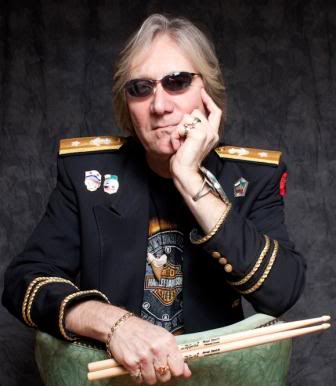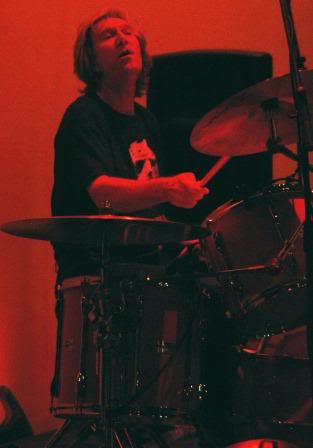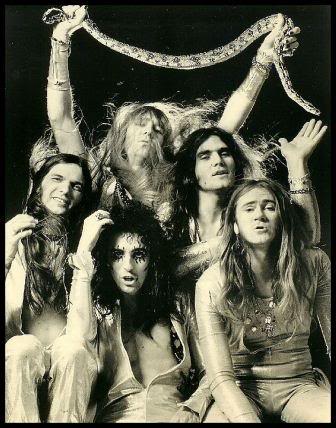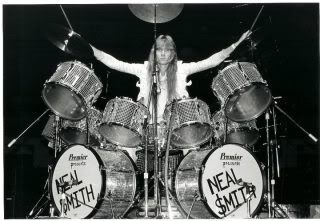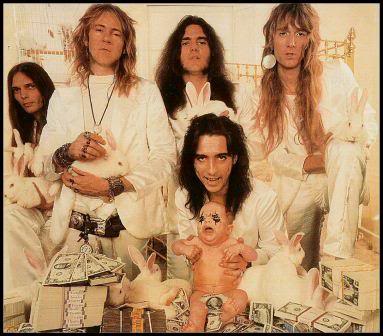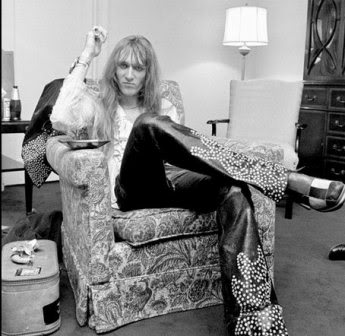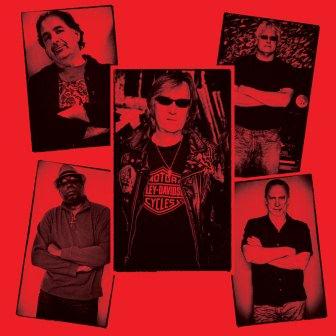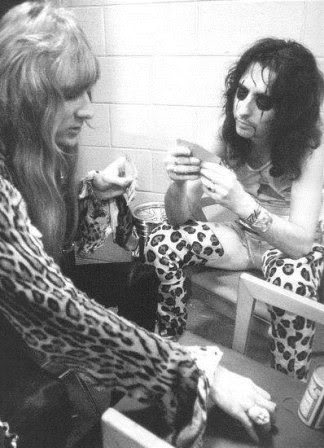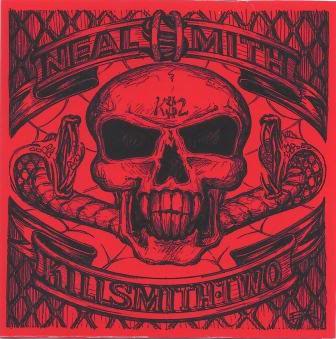
| |||||
|
|
Punk Globe: The Alice Cooper band came together when you were all in high school. How exactly did you guys meet?
Neal Smith: The original lineup of the band met when they were in high school. I met them when we were in junior college together in Glendale Arizona. The year was 1966-67. We were all in art school together, and I was in another band at the time. I got to be good friends with Glen. Mike Bruce did not go to that college, but everyone else did; even the manager and light guy. Professionally, we knew each other, but not personally. When I found out Glen was from Akron, Ohio like I was, then we became blood brothers. We became very, very close.
Punk Globe: How have things changed in the music business from then to now?
Neal Smith: Back then, the record companies really dominated the business. I think that you could fight and claw your way through once you had a band that was working well together and wrote songs. You found management, a booking agent and a record company, then you wrote good songs, then you had a chance even though the competition was pretty fierce even back then in the late 60s early 70s. At least, there was a business hierarchy - you could climb the ladder. That was the way the music business worked back then. Like the Stones or the Beatles, we were lucky enough to have some longevity and be more than a one-hit wonder. We had 6 really good albums. We recorded 8 albums. The first two we recorded with Frank Zappa really didn’t do so well. But with the business today, with technology, the Internet, mp3s and YouTube, it has really changed the dynamic of the music industry. The record companies are still there; it just seems to me that they are making more money off the classic music from decades past. Occasionally, you will have the newer hip acts that sell 5, 6, 7 million records, but for the most part if you have a recording studio and you have a video camera, you can get out there and sell 250 -300 thousand hits on a song in a couple of weeks and basically you are a success. The longevity of it is to get past the next couple of months without the next person coming in. The record companies can’t seem to grasp the technology to make it work for them. The business is turning over so fast, that whoever was a hit a couple of months ago, unless it’s Justin Beiber – that is a whole other category there, once they reach that level. A good example of that is the people that are on the Voice or American Idol. These people get contracts and are successful, they have a hit or two, but I don’t see any longevity among these people. They have tremendous exposure, the technology is there, the media is there, but it is like a throwaway business now. There is no longevity, no making a huge career out of it. I don’t know if in 15-20 years from now any of these people will be considered classic rock, pop or rap. I just think that technology has taken control of the industry and they do not know how to make it work for themselves.
Neal Smith: I will answer the last question first; the reason behind the venture was we wanted attention, and we wanted people to remember us, so we wanted to do something different. Some bands pushed the theatrical envelope a bit but we wanted to take it further. Everything we did was because we wanted to be bigger and better than anything that had come before. We became successful at it, we were known for it and became very comfortable. Spinning out of being art students, all of us contributed. To give you an example, the makeup that Alice used on the “Love it to Death” album, that was Dennis’s suggestion to wear that spider eye makeup. The snake on the “Killer” album – that was my pet snake Kachina. The electric chair from “Love it to Death”, on the song “Black Juju”, it was a song that Dennis wrote, and his idea for the stage was to build an electric chair. He and one of our roadies built the first electric chair. All of us were contributing all the time, 24/7. We had meetings, we lived under the same roof for 7 years. During that time frame it was a pure democracy, nobody dictated anything. Even our management and lighting guy, we were all throwing around ideas all the time. If everyone liked it, we did it, and if they didn’t, we didn’t do it. There were a few things that we tried that were successful, and a few things that didn’t work out. I call them our Spinal Tap moments, when things just did not go as planned, and they didn’t get the reaction that we wanted. We all had thick skin and were road warriors – we did whatever we had to do to make things work. We had a song called “Nobody Likes Me”, that wasn’t that big, but was on some of the boxed sets. We had an old back door that we found at one of the houses that we were renting at the time. We nailed 2×4s to the bottom of it so it stood up by itself. We took it on the road with us and Alice would sing the song through the door, looking like a sad kid that no one wanted to play with, and it went with the song “Nobody Likes Me”. Then the props started to make sense with the song, all the way up to the album “Killer”, where we had the gallows onstage and hung Alice. On the album “Billion Dollar Babies”, we had a song called “Unfinished Sweet” on it that I co-wrote. We had a mad dentist that would come out onstage and wreak havoc. We would write very visual songs, and that is how it all kinda evolved.
Neal Smith: There is a lot obviously, Cyndi, but the pivotal show for us that stands out, twofold, is from the summer of 1972, when we did the “School’s Out” show, and we went back to Los Angeles to headline at the Hollywood Bowl. First of all, Hollywood is where we first got our record deal with Frank Zappa. When we left there, we really weren’t making any money. We really never had success there. We were touring all over the United States, with “School’s Out”, our 3rd album on Warner Brothers. We were getting lots of airplay with “Love it to Death” and “Killer”. We were touring the heartland, around the midwest, around Chicago, Minneapolis, St. Louis, Detroit, all the way to New Orleans, and Florida – we were getting a lot of airplay with “Eighteen” and “Wheels”. But New York and LA, the east coast and west coast, were not really playing our music.
But “School’s Out” was our first big breakout hit, and New York had to play it, along with LA and San Francisco. It was twofold; we had our first across the country hit song with “School’s Out”, it went to number 2 in the charts, and then we went back. It was kinda like our victorious return to Hollywood and Los Angles, where it all began. It was in LA that I joined the band. It was our triumphant return, in the fact that Wolfman Jack announced the band riding on an elephant onstage, there was a camel and a harem of dancing girls, he announced Alice Cooper, and we did our whole “School’s Out” show, and at the end of the show a helicopter flew over. It was an outdoor arena, the Hollywood Bowl is, and they threw tens of thousands of ladies’ panties that were like the album cover. It was spectacular and even Los Angeles thought it was outrageous for a show, even with what they were used to. That was a pivotal gig for us and meant a lot to us. Punk Globe: It is reported that you used to try to keep up with Keith Moon as far as the number of drums you used. Where did this healthy competition come from and how did Keith’s passing affect you?
Neal Smith: First of all, that is like an urban legend. I am a huge fan of Keith Moon and we both had lots of drums. My drum set on the “Billion Dollar Babies” tour was the largest drum set in the world at the time. That story has been blown out of proportion over the years, and the only other person I ever talked to on the phone was Pete Townsend. As for Keith’s passing, unfortunately drummers can have a short lifespan. Back in the 70s, lots of great percussionist were lost, much to my dismay. There are not too many of them left that were my inspiration, and certainly Keith is among one of my all-time favorites to watch on stage. Fortunately I was lucky enough to see him a couple of times, once on the “Magic Bus” tour in the late 60s. It was a phenomenal show. The Who and Jimi Hendrix are some of my favorites from that era. I really love that powerful electric music. The Who were the best at that and were very theatrical. Keith, he was like a living cartoon character; he has so much personality. I was lucky to meet him several times. When we were recording the “Billion Dollar Babies” album in Morgan studios in London in late 1972 around the holidays, we also played a show at the Rainbow Theater. The Who played on Friday night and headlined, and we played on Saturday night and headlined. We went to see that show as well. They did “Tommy” and it was freaking amazing. Keith would come down – they had a bar at Morgan Studios – and we would drink and hang out. Marc Bolan was there and some other celebrity musicians, and I got to know him pretty good then, as much as you could get to know him. Keith was crazy and by sunset he was usually well on his way drinking himself silly on his cognac. But he was an amazing character and an amazing drummer. I was torn up and in shock when he passed. I just couldn’t believe it. I still miss him and still think he was one of the most amazing drummers to watch. I can never say enough about Keith. He was a huge inspiration and an amazing man, I am always gonna miss him.
Neal Smith: I have had lots of sets; the one I play today is much different than the one I played on the “Billion Dollar Babies” tour. But that was probably the biggest set I have. A little over twenty drums, and I played every one of them. It was Dennis’ idea to use a mirrored set. Kiss had one, but I had the first. We influenced them a lot and I guess that was one of the influences that they borrowed from us. That set was the most glamorous. Glitter drum sets. Like Liberace playing – he had a mirrored piano – so I thought mirrored drums would be awesome. I had just gotten a sponsorship deal with Premier drums at the time. I always had a couple of mounted toms on each bass drum, but this time I wanted to try to put three drums on it, and they did that. Nobody had ever tried to put three mounted toms on a bass drum before, but with the two toms, six mounted toms (most large sets had eight drums, but I also had four orchestra toms). I had four mounted bongos over the hi-hat, two snare drums (one between my legs, the other to the left of the hi-hat); there were 20-21 drums in that set. I still have the set and it was an amazing show kit. There is an Alice Cooper boxed set out that has performances from the “Billion Dollar Babies” tour from Texas that was remastered, and everything, especially the drums, sound fantastic on that. I also play Slingerland, Gretsch and DW drums.
Punk Globe: You wrote in my opinion the most famous drum intro to a song in “Billion Dollar Babies”; how did you come up with the idea to start the song that way, and did you know you were writing something so monumental at the time?
Neal Smith: I like to write and play drums for drummers. I know there are a lot of people that like music and like drums, but when I get a compliment from drummers on what I do, that is the most successful audience. First of all, the drums did not start out like that. The song was written and I was playing a straighter beat on the song. I had an idea to do more of a bolero or Latin sort of feel to it, and it seemed to work with the music. When you go back to the 60s, the Rolling Stones had a hit, “Get Off of My Cloud”. If anyone remembers or wants to check it out, Charlie Watts does a really cool drum intro to the song. I always liked that idea. It was short but sweet and such a signature to that song, and made it such a cool song. Charlie Watts was another one of my influences. I think he is a great drummer and it’s amazing the work he has done with the Stones. I wanted something like that for the start of “Billion Dollar Babies” because I am a rudimentary drummer. I spent two years learning the rudiments before I even owned a set of drums. I still tell people that want to learn to play drums: forget about the drum set and get yourself a snare, and learn to play that for a couple of years before you even get a set of drums. It starts out with a “bum-bum, bum-bum”, don’t know how you are going to write this, but it basically starts out with a flam on the snare drum and bass drum with a repetitive rhythm that would work throughout the song. It just evolved. Bob Ezrin, our producer, heard a straighter beat for the recording, but said if I wanted to play that in the song, again I go back to this being a democracy, but when it came to putting it on the record, Bob’s job was to make hit records and he did have the last say on what a part might be. He said if I wanted to use that intricate of a start to the song, I had to do it perfectly and in one take, so I did, and it’s still on the album today. I love to play the song, what can I tell you?
Neal Smith: In my opinion, he was the producer for the band. We worked with other producers, but Bob was like the sixth member of the band. When you were outside of the circle, you were not readily accepted by the band, because we were pretty cocky motherfuckers. We knew what we wanted to do, and in our opinion we were the hippest band in the United States at the time. We were doing things that no one ever even thought of. In the early days people told us we were crazy and that we would never make it. And later on we got the opportunity to say “Fuck you”, and we did. That was one of the things that made the band successful – we had tons of confidence. By the time someone got through working with us, either they got it or they didn’t. Bob got it from day one. He automatically became like the sixth member of the band. It was a very easy transition. We needed his help to make hit records. And when we had done the two albums with Frank Zappa, although I think they were very creative albums, they did not have the success we were looking for. Bob helped create what that commercial success would be. We would not water down what Alice Cooper was, we were creative, dangerous and theatrical. We were dangerous from the standpoint that parents and the establishment did not understand what we were doing – were we guys?, were we girls?, were we gay? – no one could figure it out, and when you can’t figure something out, you are threatened by it. How do you take that and make it multi-platinum, and take it to the top of the charts – and that is what Bob helped us do. We ended up playing some of the biggest concert shows of the 70s. Our success was a combination of everyone doing their job; it was one unit working together, and Bob was that missing part of the unit. Shep Gordon and Alive Enterprises took care of our management and he was brilliant at what he did. Bob did his job great, I did great on drums, Alice did great on stage and writing lyrics, Dennis is an amazing bass player, we all did great.
Neal Smith: I think that anybody is successful at what they do and are unique. I think we did open up a whole new genre of music, shock rock/theatrical rock, whatever you want to call it. I don’t criticize other bands’ music. I either listen to it or I don’t listen to it. I have unfortunately not listened to too many of those bands, so I am not really familiar with their music. But I know that their fans love them. Kiss music I am probably more familiar with than anybody else. I think that Slipknot is good. I am more of a song person. Going back to the Alice Cooper group, if we had just gone out there and been wild and theatrical, that would have been one thing, but you need the music to back it up. So I am a firm believer that if you want to get your message out and have hit records, if you can find an audience to buy your records so you can get out there and tour with a hit single or album, then that is success. I think those bands have done that. It is a form of flattery, but I think the biggest form of flattery we had was the Rock & Roll Hall of Fame. We were way overdue, we were eligible for 16 years, but we did get in on the first ballot, and I think we did open a whole new era of music. I think many bands in the Rock & Roll Hall of Fame did not create a whole new genre of music like we did. That’s okay, I think there are a whole lot of great bands in there and there are some that shouldn’t be in there. That is just personal. I never think of anyone that copies; I think influence is a much better word, and I hope we continue to influence bands in the future. I love it when you talk to younger fans and they love our music and are writing their own songs. That is what it is all about. That is what happened to us – we were influenced by the British Invasion. I was influenced by the Swing bands of the 40s, some of the drummers, and the music of the 50s and 60s. I hope we continue to influence musicians in the future and if they continue to carry the torch, that is a good thing.
Neal Smith: We had been trying to get together to do something like that for ten years. Finally it happened and I was excited by the way it did. It was great to get back in the studio with Bob and Mike, Dennis and Alice. Of course Glen passed away in ‘97, so he could not be there with us. We were in the studio laying down the basic tracks like we always did and it was great. I guess that like many other bands, when you get back in the studio it is the same stupid sense of humor, the same jokes. But the bottom line is, when the recorders are rolling, all the machines are on and we are in there playing, the music the chemistry is there. I think those three songs certainly stand on their own. It is in our DNA, or beyond that. When we play with other people it is one thing, but when we come together as the band Alice Cooper, then it just really works. I can tell when Dennis and I lock in on the rhythm section, and Mike is playing his guitar, Alice starts singing the melody, Bob’s producing it; it’s all there, all the pieces are there. It was fantastic and I hope to do it again sometime.
Punk Globe: You have a new band that you are working with, “Killsmith”. How long have you been working on this project and tell us about the new CD. Do you plan on touring with Killsmith soon?
Neal Smith: I would love to talk about that, it is my passion these days. I’m always happy to get back with the original Alice Cooper band, but my passion for the last 6-7 years has been my KillSmith project. Essentially KillSmith is myself – I am writing all the songs, all the lyrics, arranging the music. I played rhythm guitar on both CDs KillSmith has done, “Sexual Savior” and “KillSmith 2”, and naturally, I play drums on both as well. Peter “The Cat” Catucci is my bass player, engineer, and musical guru. He understands what we are trying to do. It’s a very heavy metal sound. It’s certainly not Rammstein, but they are a huge influence in my new music. I want to be big and bold and very crunchy, sometimes a little bit bizarre, always very dark and very sexy. In the first album, Sexual Savior, I kinda let all hell break loose. When the lyrics came, whether they were x-rated or not, they made it onto the album. I was doing it to get that part of my creative juices flowing. I have probably been saying the word fuck since I was a kid. Glen and I probably have the worst vocabulary of any of the guys in the band. I don’t like censorship of any kind, I never have. And when it comes to being creative, I will not bow down to some sense of censorship. When a song is written it has its own sense of character. The new album, “KillSmith 2”, does not have any swear words on it at all; that is just the way it worked out. The music still has the same power, the same rawness. It was written the same way as “Sexual Savior”, but just a little more melodic on the chorus and the hooks of the song. We have gotten tremendous reviews on KillSmith 2 and have sold copies all over the world. It seems to have a good heavy metal fan base, as well as some old Alice Cooper fans. It was not written to any particular target audience. I am very happy with what we have done. The video for “Squeeze Like a Python”, is on YouTube and is getting great response as well. I have two great guitar players: Kevin Frank, who, when it comes to Jimi Hendrix-type guitar playing, he is amazing. For straight-up rock, like ZZ Top and AC/DC, Doug Wahlberg is the best. I am already writing material for the next album. In the meantime, we are talking to some people about some shows. Please visit my website, nealsmithrocks.com, and you can also find me on Eacebook. If there are any shows lined up you can find the dates there.
Neal Smith: It was bittersweet for me. I would have loved it if it had happened early when Glen Buxton was alive. He was a huge influence on the band and was there from its genesis. It was an amazing night to say the least; the fact that Darlene Love was there and Neil Diamond, it was one of those nights that you thought would never happen. Because of the history of the band, we have always been on the other side of the fringe. We never got Grammy awards or any other major awards except for selling our records. It’s a little bit uncomfortable for me to be in such an accepted situation, where people have accepted Alice Cooper. You forget how frightened people were of the band. That is why I like KillSmith right now. It keeps me on the dark side of music that I am more familiar with. The song “School’s Out” is easily accepted even though it says, “school’s been blown to pieces”, but I know they try to bleep that out a lot. It was an amazing party at the Waldorf Astoria in 2011 when we were inducted. The main thing is I was happy for the fans of the band – many have been with us since the beginning. They petitioned the band to be in the Hall of Fame for many, many years. Whether that actually mattered or not, who knows, but to the band it meant a lot. I am happy, because it has always been about them. The fans put us in the position to be successful and they stayed with the band over the years. It was because of their drive and determination that we were even in there. Without fans, no band, no musician can do anything. You may as well stay in your basement and write songs – for your relatives or something. We were lucky that many people got Alice Cooper and enjoy it still to this day. It was good to see our old friend Elton John there that night, and Rob Zombie stayed with us the whole night. It was an amazing time. We got to get the band together and do some shows before and after our induction as well as at the Hall of Fame, and from all of those standpoints, it was an amazing night and something I will always be grateful for.
Punk Globe: You had the privilege of being associated with one of the founding bands of rock and roll. If you had to name one thing that you would like to be remembered for, what would it be?
Neal Smith: My love for the music and the theatrics, and getting to be a part of it. Rolling Stone once did a top 10 of theatrical props for shows and number one was Alice Cooper’s snake. Alice Cooper’s snake was my pet snake, Kachina. There was the perfect song, called “Is it my Body”, that it was used on. I was lucky to be part of an amazing band and I hope that people remember me as well as the other guys who contributed to the writing of the songs, to what you saw on stage. Every once in a while I wrote a drum part that people enjoyed and I was having a blast playing that stuff.
Punk Globe would like to thank the fabulous Neal Smith for the interview..
|
|
|
